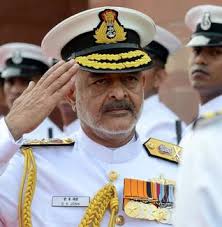Joshi, who had about 15 months more left in service, submitted his resignation hours after submarine INS Sindhuratna had a mishap in which seven sailors were taken seriously ill and two officers were missing.
The Defence Ministry immediately accepted his resignation and ordered that Vice Chief of Naval Staff Vice Admiral R K Dhowan should take over as the Acting Chief till regular Chief is appointed.
"Taking moral responsibility for the accidents and incidents which have taken place during the past few months, the Chief of Naval Staff Admiral D K Joshi today resigned from the post of Navy Chief," Defence Ministry said.
"The Government has accepted the resignation of Admiral Joshi with immediate effect," it said.
This would be the first time in the last 15 years that a Naval chief has had to leave office in controversial circumstances after Admiral Vishnu Bhagwat was sacked by the NDA Government in 1998 when George Fernandes was the Defence Minister.
Reflecting the gravity of the mishap, Defence Minister A K Antony briefed President Pranab Mukherjee, who is also the Supreme Commander of Armed Forces, and Prime Minister Manmohan Singh on the accident.
There have been 10 reported incidents involving naval assets in the last seven months involving the INS Sindhuratna mishap early today in which two officers are missing and seven sailors were affected severly due to smoke inhalation.
The biggest mishap occured when the INS Sindhurakshak sank inside the Mumbai harbour killing all 18 personnel on board on August 14.
Earlier this month, INS Airavat, an amphibious warfare vessel, ran aground after which the commanding officer was stripped of his command duties.
After the sinking of the INS Sindhurakshak, one of the mishaps involved INS Betwa which was damaged after probably hitting some underwater object.
India's leading minesweeper, the INS Konkan that was undergoing repairs in Vizag, also caught fire and suffered major damage to its interiors. The Pondicherry-class minesweeper was getting a refit at a dry dock when the incident occurred.
The naval headquarters is concerned over the spate of mishaps in the Western Command and had even summoned Western Naval Commander Vice Admiral Shekhar Sinha on the issue.
The Western Command headquarters was damaged when Naval Armament Depot personnel misfired a heavy-calibre gun at it while checking it.





Comments
Add new comment